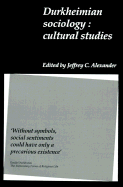Book contents
- Frontmatter
- Contents
- List of contributors
- Acknowledgements
- Introduction: Durkheimian sociology and cultural studies today
- Social change and sacralization
- Micro and macro in symbolic context
- 4 Religious elements in friendship: Durkheimian theory in an empirical context
- 5 The Durkheimian tradition in conflict sociology
- 6 Social structure and civil religion: legitimation crisis in a late Durkheimian perspective
- Ritualization and public life
- Index
5 - The Durkheimian tradition in conflict sociology
Published online by Cambridge University Press: 05 July 2011
- Frontmatter
- Contents
- List of contributors
- Acknowledgements
- Introduction: Durkheimian sociology and cultural studies today
- Social change and sacralization
- Micro and macro in symbolic context
- 4 Religious elements in friendship: Durkheimian theory in an empirical context
- 5 The Durkheimian tradition in conflict sociology
- 6 Social structure and civil religion: legitimation crisis in a late Durkheimian perspective
- Ritualization and public life
- Index
Summary
Of the great classic figures of sociology, at the present time Durkheim's reputation is the lowest. In recent decades, Marx has been riding at his highest wave of sociological popularity of the entire century since his death in 1883. Weber, too, is probably at his peak influence, especially in the U.S., but also for the first time in German sociology, where he has recently become the subject of massive reinterpretation and appropriation by various theoretical programs. As Marxism falters in its appeal in Germany, Weberianism looks in good position to overtake it. But Emile Durkheim, the most classic of the triumvirate – the only one to actually hold a chair of sociology, the author of sociology's most powerful manifestos, “Mr. Sociology” himself – is probably at his low point in popularity in the seventy years since his death in 1915.
The reason is not hard to find. Durkheim was introduced into sociology largely under the auspices of the functionalists of the English-speaking world: Radcliffe-Brown and his followers in Britain, Merton and Parsons in the U.S. Relatedly, Durkheim was picked up as a founder of multivariate statistics, and hence given a place in the positivist/quantitative camp of the 1950s and 60s. No wonder then that most of the intellectual factions today have nothing but disdain for Durkheim. He is regarded as a conservative defender of the status quo by the Left, as an arch-functionalist by the anti-functionalists, as a naive unilinear evolutionist by the historicists.
- Type
- Chapter
- Information
- Durkheimian SociologyCultural Studies, pp. 107 - 128Publisher: Cambridge University PressPrint publication year: 1988
- 34
- Cited by



